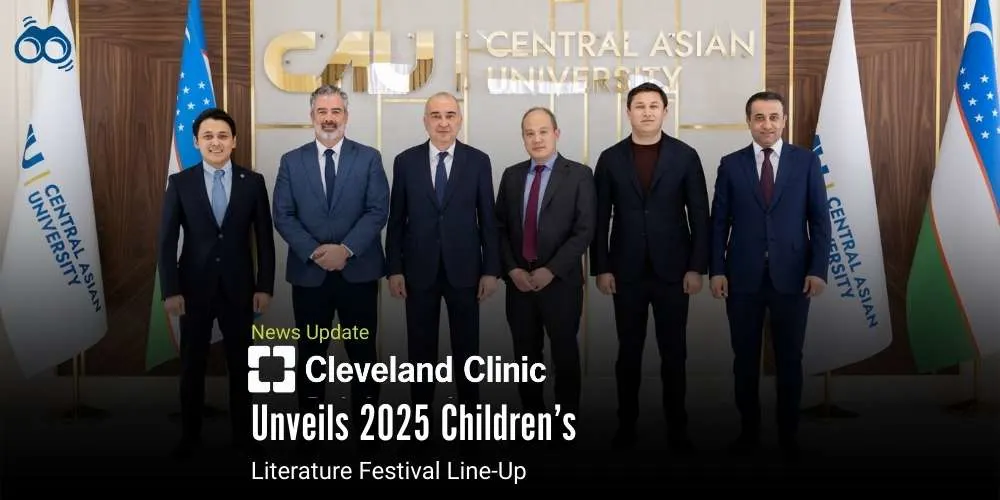Cleveland Clinic Connected Welcomes Central Asian University Hospital
Global Healthcare Partnership Announced: Cleveland Clinic to Guide New University Hospital in Tashkent
Cleveland Clinic, a globally recognised healthcare system operating 23 hospitals and employing over 82,000 professionals, has entered into a strategic collaboration with Central Asian University (CAU) to support the development of a new hospital-university project in Uzbekistan. Under this agreement, Cleveland Clinic will provide expert guidance across several domains, including hospital design and operations, medical education and residency programme validation, nursing school and simulation centre development, clinical observations, faculty exchange, physician recruitment, and digital transformation of healthcare systems.
The partnership centres on the establishment of Central Asian University Hospital, a landmark facility to be built on CAU’s expanding medical campus in Tashkent. Ground-breaking is expected later this year, with the hospital designed to reflect the Cleveland Clinic’s model of care, combining advanced infrastructure, multidisciplinary clinical centres and world-class equipment. Initially planned as a 120-bed facility, it is projected to serve nearly 269,000 patients annually, positioning it among the most efficient and modern hospitals in the region.
As part of the collaboration, the hospital has joined the Cleveland Clinic Connected programme as a provisional member. This global initiative links independent institutions with the Cleveland Clinic’s standards in clinical excellence and operational performance. CAU’s leadership is currently progressing through quality assessment procedures to achieve full membership. In addition to infrastructure and clinical support, the agreement includes the transfer of protocols, administrative methodologies and training frameworks to build a sustainable and high-performing healthcare workforce. Dr Tommaso Falcone, Executive Vice President and President of International and Emerging Markets at Cleveland Clinic, noted that the partnership reflects the organisation’s mission to extend high-quality care globally, stating, “Our goal is to bring Cleveland Clinic’s model of excellence to patients wherever they are.”
Kamran Gulamov, Rector of Central Asian University, described the collaboration as a transformative milestone for Uzbekistan’s medical education and healthcare delivery. He emphasised that access to global best practices would help set new standards for hospital service and clinical training across the country. The hospital will serve as a clinical and academic anchor for CAU’s broader campus expansion, which includes a $250 million investment to grow from 10.3 to 45 hectares. This development will encompass a 400-bed private hospital, maternity centre, dental school, medical research institute, and a nursing school for 900 students. It will also host a residency programme for 400 trainees and a medical training facility with capacity for 3,000 students.
Beyond clinical care, the campus will feature a central library with 30,000 publications, an innovation ecosystem with 25 startup zones, and a student hub dedicated to career development, media production and entrepreneurship—further supporting CAU’s ambition to become a regional leader in education, research and healthcare innovation. Patients in Uzbekistan will benefit from improved access to high-quality care, enhanced clinical services and, where necessary, referrals to the Cleveland Clinic’s international hospitals. The collaboration also aligns with Uzbekistan’s national goals for import substitution in education and healthcare, enabling professionals to train locally to global standards. Cleveland Clinic has reiterated that the Connected programme is designed to build a global network of independent, quality-driven institutions committed to better patient outcomes. By partnering with organisations such as CAU, the programme seeks to strengthen hospital-university models, expand access to modern healthcare, and support the growth of sustainable systems worldwide. This partnership marks a pivotal step in advancing healthcare and medical education across Central Asia.
Editor’s Note
The agreement between the Cleveland Clinic and Central Asian University (CAU) marks an important step in the development of healthcare and medical education in Central Asia. This collaboration is more than just a building project. It represents a clear move towards global standards in clinical care, academic training, and hospital design. Cleveland Clinic contributes not only its strong reputation but also its proven way of operating. Its model has been tested across 23 hospitals with a global workforce of more than 82,000 people. The support offered is both practical and strategic. It includes guidance on hospital design, development of medical curricula, and the introduction of digital transformation into Uzbekistan’s growing healthcare system. This partnership is not symbolic. It is a serious transfer of knowledge and expertise. CAU is also not a passive partner in this project. It is playing an active role in shaping regional change. With its expanding campus and its plan to train thousands of future professionals, the university is positioning itself as a hub for innovation, research, and clinical excellence. Its decision to adopt the Cleveland Clinic’s high standards shows a strong vision for the future of healthcare in Uzbekistan. The value of this partnership lies in its dual focus. On one side, the hospital will provide modern medical care for patients today. On the other side, the systems, protocols, and academic pathways being put in place will influence the education of doctors, researchers, and administrators for years to come. Sustainable healthcare is built in this way, through combined infrastructure and long-term capacity building, not through one-time investments.
According to Skoobuzz, international partnerships should move beyond names and branding. They must reflect shared responsibility, knowledge exchange, and the ambition to aim higher. Uzbekistan is not merely receiving a hospital; it is collaborating withthe Cleveland Clinic to build a new model of healthcare.














0 Comments (Please Login To Continue)